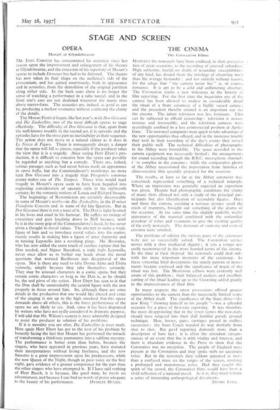THE CINEMA
The Coroaation Films
HITHERTO the newsreels have been confined, in their present 1- tion of great occasions, to the recording of external splendour. High authority, fearful no doubt of wounding susceptibilitie ; of any kind, has denied them the privilege of observing more than the average bystander ; and not entirely without reason, for the adage that " the camera never lies " is, of course, nonsense. It is apt to be a cold and unflattering observer. The Coronation marks a new milestone in the history of film reporting. For the first time the inquisitive eye of the camera has been allowed to analyse in considerable detail the ritual of a State ceremony of a highly sacred nature ; and the precedent thereby created is an important one for the cinema. The infant television was less fortunate. Film can be subjected to official censorship : television is instan- taneous and irrevocable, and the television cameras were accordingly confined to a less controversial position at Apsley Gate. The newsreel companies were quick to take advantage of the new opportunities thus offered, and in the immense trouble they took in their recording of the day's events they served their public well. The technical difficulties of photography in the Abbey were formidable. The space accorded to the camera equipment was necessarily limited ; the arrangements for sound recording through the B.B.C. microphone channels -'re complex in the extreme ; while the comparative gloom of the Abbey necessitated the importation from America of ultra-sensitive film specially prepared for the occasion.
The results, at least so far as the Abbey ceremony was concerned, represented something of a technical triumph. Where an impression was generally expected an exposition was given. Despite bad photographic conditions the clarity of many shots allowed not only a study of the principal par- ticipants but also identification of secondary figures. Here and there the camera, catching a nervous gesture amid the crash of trumpets, brought out something of the drama of the occasion. At the same time the slightly underlit, washy appearance of the material combined with the unfamiliar grandeur of robes and vestments to give the exciting quality of the early newsreels. The demands of curiosity and even of emotion were satisfied.
The problems of editing the various parts of the ceremony were not so successfully solved. The Coronation service moves with a slow mediaeval dignity ; it sets a tempo not easily reconstructed in the more hurried terms of the cinema. In the time at their disposal the newsreels could deal only with the more important moments of the ceremony. In these somewhat brief descriptions the stately pattern of move- ments became confused and the significance of much of the ritual was lost. The Movietone editors were evidently well aware of this problem ; their balanced analysis and excellent cutting of the ritual leading up to the Crowning added greatly to the impressiveness of their film.
In many respects the street processions offered greater opportunities to the camera than the necessarily limited scope of the Abbey itself. The significance of the State drive—the new King "showing himself to his people "—was a splendid occasion for a piece of first-rate reporting. It was therefore the more disappointing that in the street scenes the newsreels should have relapsed into their dull familiar parade ground technique. Men, horses, guns, carriages passed in endless succession ; the State Coach wended its way dutifully from shot to shot. But goad reporting demands more than a description of bare fact ; it is often the attendant circum- stances of an event that fire it with vitality and interest, and there is abundant evidence in the Press to show that the Coronation was no exception. The people of England were present at the Coronation and they spoke with no uncertain voice. But in the newsreels they seldom appeared as more than a confused mass on the verges of the screen, emitting a prolonged and monotonous noise. Had they caught the spirit of the crowd, the Coronation films would have been a vivid reflection of a national mood. As it is, they must remain a series of interesting anthropological documents.
STUART LEGG.






































 Previous page
Previous page